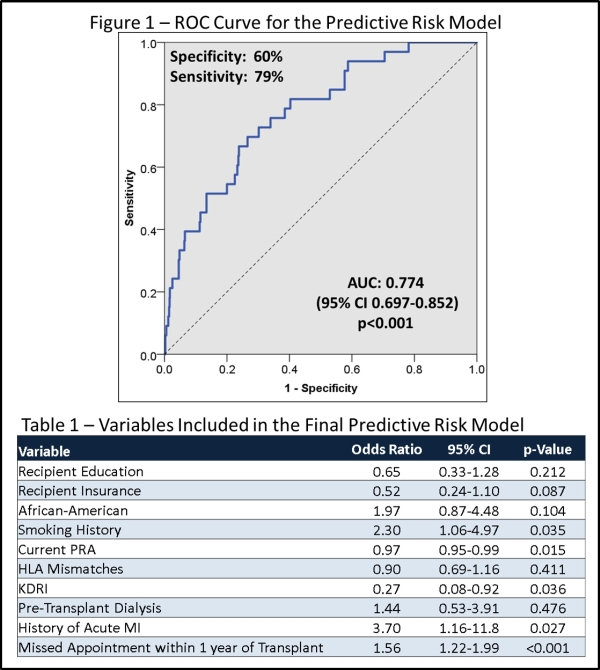Predicting Late Medication Non-Adherence in Adult Kidney Transplant Recipients.
MUSC, Charleston, SC.
Meeting: 2016 American Transplant Congress
Abstract number: A228
Keywords: Immunosuppression, Kidney transplantation, Screening
Session Information
Session Name: Poster Session A: Long Term Outcomes in Kidney Transplantation
Session Type: Poster Session
Date: Saturday, June 11, 2016
Session Time: 5:30pm-7:30pm
 Presentation Time: 5:30pm-7:30pm
Presentation Time: 5:30pm-7:30pm
Location: Halls C&D
Background: Medication non-adherence (MNA) is a significant contributor to late graft loss in kidney transplant recipients. The aim of this study was to develop and internally validate a predictive risk assessment model with the hopes of improving clinicians' ability to identify recipients at high risk of developing MNA.
Methods: A retrospective longitudinal data set which included adult solitary kidney recipients transplanted between 2005 and 2014 was utilized for this analysis. Pediatrics, multi-organ recipients and those with graft failure or follow up of less than one year were excluded. The exposure time period was up to one year post-transplant and the outcome of interest was late (>1 year) MNA. Detailed review of medical records was used to identify MNA. Logistic regression with backward elimination was used to develop the model, with bootstrapping (1,000 iterations) for internal validation.
Results: 1,307 kidney transplant recipients were included; of which 33 had documented MNA after one year post transplant. Those with late MNA had 3.0 times the odds of late acute rejection (OR 3.00 95% CI 1.02-8.83); 12.1% in the MNA group and 4.4% in the non-MNA cohort, p=0.036. The risk model, using baseline and follow up variables out to one year post-transplant predicted late MNA well (AUC 0.774, 95% CI 0.697-0.852, Figure 1), with 60% specificity, 79% sensitivity, 99% NPV and 5% PPV. The most important factors for late MNA included insurance type, smoking status, history of acute MI, cPRA and missed appointments during the first year post-transplant (Table 1). Bootstrapping demonstrated strong internal validity (overall model bias -0.015).
Conclusion: Although late medication non-adherence was rarely documented in this cohort of kidney transplant recipients, it was significantly associated with clinical outcomes and could be predicted by using baseline characteristics and most importantly, missed appointments during the first year post transplant.

CITATION INFORMATION: Taber D, Posadas A, Chokkalingam A, Browning R, Salazar N, Kamel M, Pullalarevu R, Kadri B, Chavin K, Srinivas T, Baliga P. Predicting Late Medication Non-Adherence in Adult Kidney Transplant Recipients. Am J Transplant. 2016;16 (suppl 3).
To cite this abstract in AMA style:
Taber D, Posadas A, Chokkalingam A, Browning R, Salazar N, Kamel M, Pullalarevu R, Kadri B, Chavin K, Srinivas T, Baliga P. Predicting Late Medication Non-Adherence in Adult Kidney Transplant Recipients. [abstract]. Am J Transplant. 2016; 16 (suppl 3). https://atcmeetingabstracts.com/abstract/predicting-late-medication-non-adherence-in-adult-kidney-transplant-recipients/. Accessed March 5, 2026.« Back to 2016 American Transplant Congress
